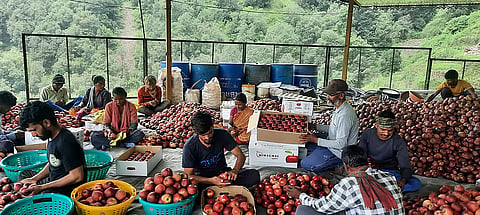

Once regarded as a symbol of taste, quality and nutrition, the native apples grown in India's hilly states are now under severe threat.
The influx of cheap, glossy, and attractively packaged imported apples has pushed lakhs of apple growers in Himachal Pradesh, Jammu & Kashmir, and Uttarakhand to the margins. While farmers in these regions were already grappling with challenges like climate change, rising input costs and declining productivity, the flood of foreign apples in the market has dealt a severe blow to their incomes.
According to the Union Ministry of Commerce, India imported 469,000 metric tonnes of apples from 25 countries in 2023. Major exporters include Turkiye, Iran, Poland, Italy, Chile, South Africa, New Zealand and the United States. These apples are rapidly gaining market share in India due to their lower cost, better packaging, and year-round availability.
In Himachal Pradesh alone, the annual apple trade is worth over Rs 5,000 crore, supporting the livelihoods of 2 to 3 lakh families. The economic impact of imported apples has left local orchardists deeply worried.
On 24 May, Himachal Chief Minister Sukhvinder Singh Sukhu urged the Prime Minister to impose a ban on apple imports from Türkiye and Azerbaijan. The Prime Minister assured that efforts would be made to protect Himachal’s apple growers during the upcoming harvest season.
Meanwhile, Rajesh Dhanta, General Secretary of the Himalayan Apple Growers Society, has also written to Prime Minister Narendra Modi, urging a halt to apple imports from Turkiye. Dhanta states that imported apples are undercutting local produce.
“When foreign apples enter the market, prices of hill-grown apples drop sharply. Sometimes, growers cannot even recover their production costs,” he said.
This issue is also being linked to India’s ongoing ‘Operation Sindoor’ against Pakistan following the recent terrorist attack in Pahalgam, as Türkiye has openly supported Pakistan during this period.
Dhanta further pointed out that the lack of infrastructure, marketing systems and proper cold storage facilities prevents a steady supply of apples to the market.
“Sometimes there's a shortage of apples, and sometimes a glut during the peak season. If our growers had access to robust infrastructure, we could compete effectively,” he added.
Sanjay Chauhan, president of the Samyukt Kisan Morcha and an orchardist himself, stated that foreign countries are dumping their produce in India, negatively impacting the agricultural and horticultural sectors. He added that cheap apples entering under the provisions of the South Asian Free Trade Area (SAFTA) pose a serious challenge.
“The Indian government must take this issue seriously and act decisively,” he urged.
He advocated for a 100 per cent import duty on apples, similar to that imposed on coffee and tea. “Growers have long been demanding higher import tariffs, but in contrast, the central government reduced the import duty on US apples by 20 per cent two years ago,” he noted.
As a result, apple imports from the United States plummeted from 127,908 tonnes (worth $145 million) in 2018-19 to just 4,486 tonnes ($5.27 million) in 2022-23. However, countries like Turkiye, Chile, Iran and New Zealand have filled this gap.
Once again, the apple growers are demanding that the central government impose a ban on imported apples and raise import duties to between 50 per cent and 100 per cent to save the struggling sector.
Another major concern is the absence of a Minimum Support Price (MSP) for apples. If the government were to include apples under the MSP scheme, it would provide farmers with a safety net against price crashes.
This struggle is not just about competition with imported apples. It's a fight to preserve livelihoods, culture and identity. Apples grown in India's hill regions are not only the backbone of the local economy but also part of an agricultural heritage that must be protected from being erased under global market pressures.
If timely policy measures are not taken, the unique taste of native apples may soon become a thing of the past — replaced by foreign apples as permanent guests on Indian dining tables.